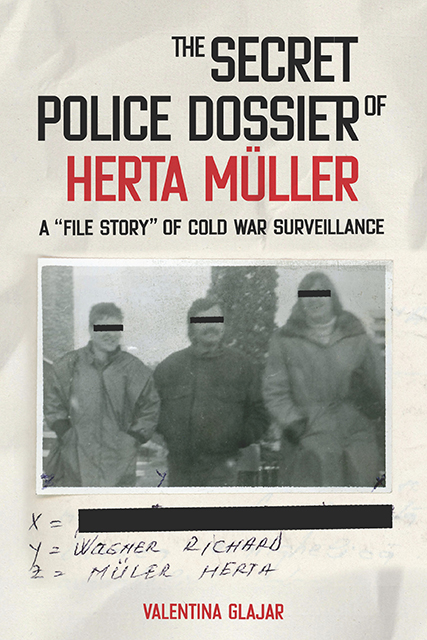Book contents
- Frontmatter
- Dedication
- Contents
- Preface
- Terms and Abbreviations
- Introduction
- 1 The Filed Story of Niederungen
- 2 Contact Stories: The Author and the Officer
- 3 Conspiratorial Stories: The Securitate Sources MAYER, SORIN, and EVA
- 4 Captured Stories: Remote Audio Surveillance
- 5 Migrating Stories
- Epilogue
- Bibliography
- Appendix I Müller’s Surveillance Timeline (1974–93)
- Appendix II Author’s Accreditation by CNSAS
- Index
Appendix I - Müller’s Surveillance Timeline (1974–93)
Published online by Cambridge University Press: 10 June 2023
- Frontmatter
- Dedication
- Contents
- Preface
- Terms and Abbreviations
- Introduction
- 1 The Filed Story of Niederungen
- 2 Contact Stories: The Author and the Officer
- 3 Conspiratorial Stories: The Securitate Sources MAYER, SORIN, and EVA
- 4 Captured Stories: Remote Audio Surveillance
- 5 Migrating Stories
- Epilogue
- Bibliography
- Appendix I Müller’s Surveillance Timeline (1974–93)
- Appendix II Author’s Accreditation by CNSAS
- Index
Summary
1974
February 5: BERT reported that there were two German-language literary circles at the University of Timişoara: Universitas, where most of the AGB members read, and Aktionskreis 74, which was considered weaker, and where Herta Müller, a student in her second year, also participated (INTERPRETUL, vol. 2, 6).
1975
October 16: HEINE reported that Herta Müller, a senior student, had heard that the AGB members had been arrested at the border and wanted to know if that was true (INTERPRETUL, vol. 2, 64).
1976
February 2: VOICU reported that “a girl” had presented her poems at Adam Müller-Guttenbrunn (ZIARISTUL, 58). Later, when pressed for details, VOICU clarified that her name was Herta Müller-Karl and she was a student in her fourth year at the University of Timişoara. Both VOICU and GRUIA reported that the consensus was that her poems were weak (ZIARISTUL, 60; 61).
1977
September 2: Müller applied for emigration with her first husband, whose name appears both as Herbert Karl and Wilhem-Mihai Karl in Müller's file. As justification for emigration, her husband invoked the fact that she could not publish her writings—quite prematurely at that point in her very early career (CRISTINA, vol. 1, 241).
1978
March 25: Müller withdrew her emigration request because her father had passed away and she wanted to stay with her mother (CRISTINA, vol. 1, 241). She subsequently divorced her first husband, who emigrated to West Germany.
December 14: MAYER reported that Herta Müller, a translator at Tehnometal, had read at the AMG (INTERPRETUL, vol. 2, 192).
1979
December 3: SANDA reported to her handler, Lt.-Col. Ion Cristescu, that Müller, Wagner, Totok, Lippet, and Waitz had been seen often in the company of the West German lecturer Dagmar Lehmann, and with her they were said to have established an intimate literary circle (ZIARISTUL, 91).
1980
February 23: In a report to his handler, Pădurariu, MAYER deemed Müller's short stories—in particular “Großmutters Schlaf,” which was published in NL 12/1979—to be “pornographic” (ZIARISTUL, 100).
May 9: Wagner's surveillance file was officially opened under the code name ZIARISTUL.
June 14: MAYER reported about the visit of the German Romanian literary critic and NL editor Gerhardt Csejka to Timişoara on June 5. Csejka attended the AMG meeting where the literary prizes were awarded.
- Type
- Chapter
- Information
- The Secret Police Dossier of Herta MüllerA 'File Story' of Cold War Surveillance, pp. 261 - 273Publisher: Boydell & BrewerPrint publication year: 2023



